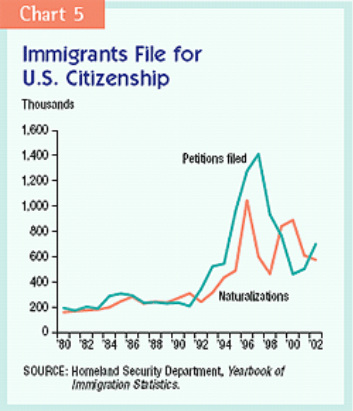Changes to Immigration Policies

The attacks of September 11, 2001, transformed the idea of global security as well as borders and immigration. The lives of Muslim Americans instantly changed because they began to draw strong attention and suspicion from federal law-enforcement as well as the general American population. This once again shows how 9/11 events made the society have some dystopian qualities. One should not have to live in constant fear because of something that they did not do. "Of the more than 400 U.S. prosecutions of individuals on terrorism-related charges, virtually none charged were involved in a plot against America"(Tirman). In a sense America kind of held the religion of Islam responsible for the 9/11 attacks.
Muslim Americans were not the only individuals effected by the 9/11 attacks. In 2005, the U.S. Congress passed the House bill also known as Border Protection, Antiterrorism, and Illegal Immigration Control Act of 2005. This law "makes entry by unauthorized immigrants an aggravated felony"(Tirman). This has affected people who are trying to come into the country especially because getting a visa or student visa has become very difficult ever since 9/11. Another group of people that were troubled by the 9/11 events were latinos. "For Latinos in the United States, the perceived level of intimidation has gone up markedly since 9/11. In a lengthy survey of Californians taken a year ago, the University of Southern California reports that since 9/11, 55 percent of Hispanics felt less secure. Eighty percent said they worry more about the future than before 9/11. Thirty-seven percent report making less money than before 9/11, and 72 percent of those attribute those losses to 9/11."(Tirman). The post 9/11 life of many minorities is difficult to experience, which shows how this is a dystopian aspect of life.
Muslim Americans were not the only individuals effected by the 9/11 attacks. In 2005, the U.S. Congress passed the House bill also known as Border Protection, Antiterrorism, and Illegal Immigration Control Act of 2005. This law "makes entry by unauthorized immigrants an aggravated felony"(Tirman). This has affected people who are trying to come into the country especially because getting a visa or student visa has become very difficult ever since 9/11. Another group of people that were troubled by the 9/11 events were latinos. "For Latinos in the United States, the perceived level of intimidation has gone up markedly since 9/11. In a lengthy survey of Californians taken a year ago, the University of Southern California reports that since 9/11, 55 percent of Hispanics felt less secure. Eighty percent said they worry more about the future than before 9/11. Thirty-seven percent report making less money than before 9/11, and 72 percent of those attribute those losses to 9/11."(Tirman). The post 9/11 life of many minorities is difficult to experience, which shows how this is a dystopian aspect of life.
